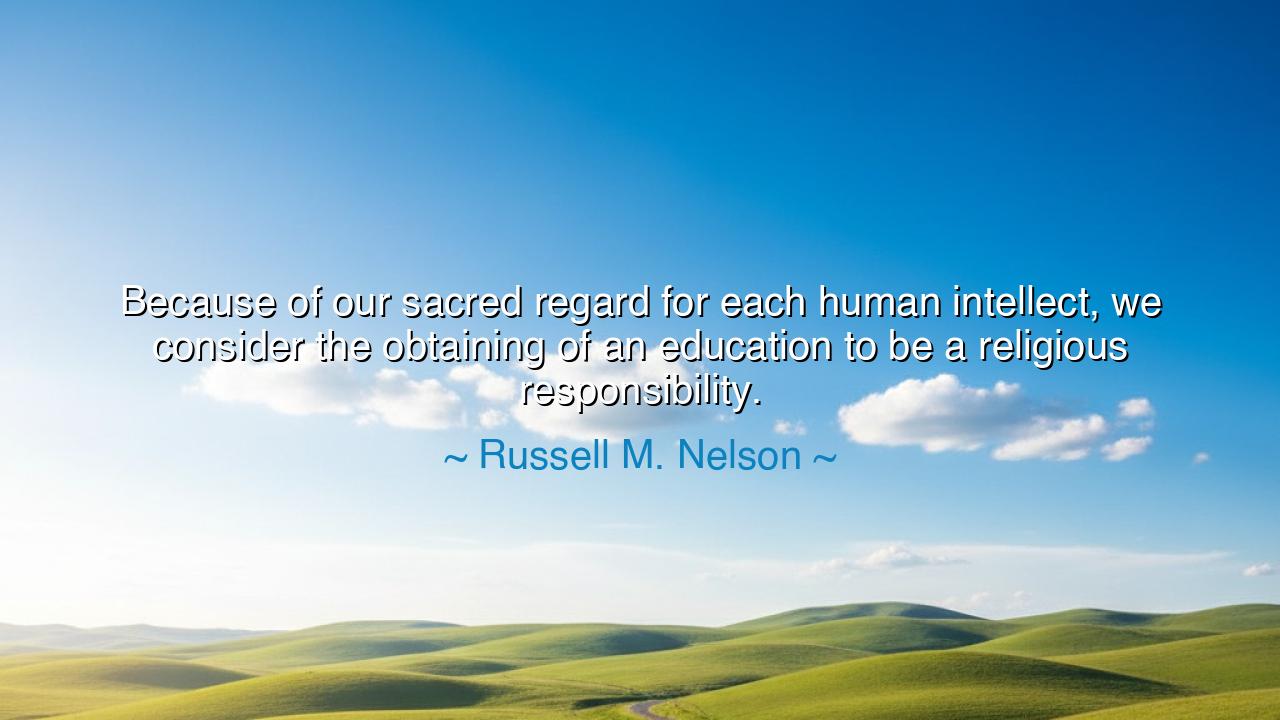
Because of our sacred regard for each human intellect, we
Because of our sacred regard for each human intellect, we consider the obtaining of an education to be a religious responsibility.






Hear the solemn words of Russell M. Nelson, who proclaimed: “Because of our sacred regard for each human intellect, we consider the obtaining of an education to be a religious responsibility.” In this teaching, he lifts the pursuit of learning from the realm of mere ambition into the realm of the holy. He declares that to nurture the mind is not simply to sharpen tools for worldly gain, but to honor the divine spark placed within each soul. For if the mind is a gift, then to leave it undeveloped is to neglect the sacred trust of God Himself.
To hold each human intellect in sacred regard is to affirm that no person is without value, no mind without potential. The child in the village, the laborer in the field, the scholar in the university—all bear within them the same flame of reason. Education, then, is not a privilege for the few, but a duty owed to all. It is a way of reverencing the image of God, who endowed humanity with thought, memory, imagination, and the power to seek truth. To deny a person learning is to dim the divine light within them; to encourage it is to let that light shine brighter upon the earth.
Consider the example of Frederick Douglass, born into slavery and forbidden to learn. He risked punishment to study secretly, driven by the conviction that knowledge was the key to freedom. When at last he became a great orator and statesman, he testified that education had been his deliverance. His life is a witness that learning is not merely an advantage, but a sacred duty to liberate the human spirit. Douglass’s struggle mirrors Nelson’s teaching: education is holy work, and to pursue it is to honor the divine within.
So too in ancient times, the rabbis of Israel and the philosophers of Greece saw learning as a path to virtue and communion with the eternal. They understood that the sharpening of the mind prepares the soul for wisdom. For the untrained intellect may wander in confusion, but the educated mind becomes a vessel for discernment, justice, and understanding. Thus, education as a religious responsibility is not only about facts and skill, but about preparing the soul for higher service, both to God and to humanity.
In declaring this truth, Nelson unites the worldly with the spiritual. He calls upon us to see the classroom as a temple, the book as a sacred vessel, the act of study as a form of devotion. To learn of the sciences is to marvel at creation; to study history is to perceive the unfolding hand of Providence; to read and write is to join the unbroken chain of human testimony across the centuries. Every page turned in pursuit of truth is, therefore, a silent hymn, a reverence offered to the Creator of intellect.
The lesson, my children, is this: never despise learning, nor grow weary in its pursuit. See it not as a burden but as a sacred journey. If you are young, devote yourself to study with diligence. If you are old, continue to learn, for the sharpening of the mind has no end. And if you are a parent, teach your children that education is not optional, but holy—an offering they make with their effort and persistence. In doing so, you prepare them not only for worldly success, but for eternal purpose.
Practical actions must follow these truths. Set aside time each day to expand your mind. Read not only what is easy, but also what stretches you. Seek mentors and teachers who can guide your path. Support efforts to bring education to those who lack it, for to give a person knowledge is to give them freedom, dignity, and hope. And above all, approach learning with gratitude, knowing it is a form of worship—the honoring of the divine intellect within you.
Thus, let us carry Nelson’s words as a sacred banner: education is a religious responsibility. To learn is to honor God, to teach is to serve humanity, and to grow in wisdom is to draw nearer to the divine. Let each of us walk this path with reverence, so that the light of knowledge may shine through us, illuminating the way for all who come after.






AAdministratorAdministrator
Welcome, honored guests. Please leave a comment, we will respond soon